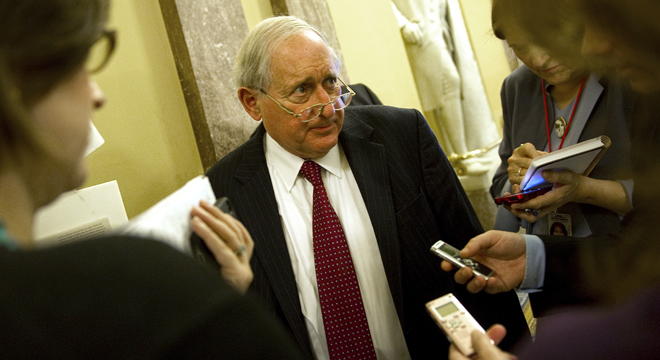Moments before he officially announced Thursday he won’t seek reelection in 2014, Sen. Carl Levin (D-MI) spoke with TPM about his central role in stopping filibuster reform early this year.
His message? No regrets.
“We did the right thing,” Levin said shortly after the resolution of a 13-hour talking filibuster mounted by Sen. Rand Paul (R-KY), which supporters of reforming the filibuster want to require for all filibusters.
Levin’s remarks came in the wake of a series of high-profile Republican filibusters on legislation and nominees that have left key Democrats deeply frustrated and threatening to revisit reform. They expressed high hopes that the bipartisan rules change enacted in January — which was constructed around an alternative proposal written by Levin and Sen. John McCain (R-AZ) — would usher in a new era of comity in the Senate.
“It’s eased [gridlock] somewhat in terms of post-cloture. We’ve reduced the amount of post-cloture time. That’s a significant improvement,” Levin said, responding to his Democratic colleagues’ frustrations. “The changes are valuable in a number of ways.”
The rules change enacted with broad bipartisan support six weeks ago did not change the filibuster, but it allowed the majority to speed up Senate business in other ways. Levin prevailed upon Senate Majority Leader Harry Reid (D-NV) to reject a more sweeping plan pushed by Sen. Jeff Merkley (D-OR), arguing that changing the rules on a partisan basis would have destroyed whatever camaraderie was left in Congress.
“It’s up to us to force people to filibuster,” Levin said. “We have the power under the current rules. The problem is that we have not forced the people who threaten to filibuster to filibuster. … We need to do that under the current rules. It will succeed.”
When Democrats brought up their sequestration plan last month, they forced Republicans to mount a public filibuster. So Senate Minority Leader Mitch McConnell (R-KY) issued a live objection to a straight up-or-down vote and Republicans withheld their support for letting the legislation move forward. It failed despite having majority support. Under the Merkley plan, McConnell and his colleagues would have had to speak ceaselessly on the floor until Democrats backed down in order to prevent the bill from coming to a vote.
Levin, 78, the chairman of the Armed Services Committee, is the chief Democratic opponent of Merkley’s plan. He said if the filibuster is to be defeated, it must be done under existing rules.
“We must show the same will, the same willpower, the same determination to defeat the filibuster,” he told TPM, as Republicans show in using it.






